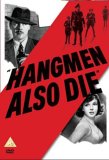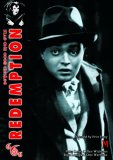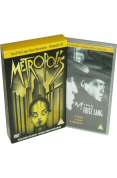![Scarlet Street [1946]](/pictures/1012866.jpg) Scarlet Street | DVD | (18/03/2002)
from £14.98
| Saving you £1.01 (6.74%)
| RRP
Scarlet Street | DVD | (18/03/2002)
from £14.98
| Saving you £1.01 (6.74%)
| RRP In a way, Scarlet Street is a remake. It's taken from a French novel, La Chienne (literally, "The Bitch") that was first filmed by Jean Renoir in 1931. Renoir brought to the sordid tale all the colour and vitality of Montmartre; Fritz Lang's version shows us a far harsher and bleaker world. The film replays the triangle set-up from Lang's previous picture, The Woman in the Window, with the same three actors. Once again, Edward G Robinson plays a respectable middle-aged citizen snared by the charms of Joan Bennett's streetwalker, with Dan Duryea as her low-life pimp. But this time around, all three characters have moved several notches down the ethical scale. Robinson, who in the earlier film played a college professor who kills by accident, here becomes a downtrodden clerk with a nagging, shrewish wife and unfilled ambitions as an artist, a man who murders in a jealous rage. Bennett is a mercenary vamp, none too bright, and Duryea brutal and heartless. The plot closes around the three of them like a steel trap. This is Lang at his most dispassionate. Scarlet Street is a tour de force of noir filmmaking, brilliant but ice-cold. When it was made the film hit censorship problems, since at the time it was unacceptable to show a murder going unpunished. Lang went out of his way to show the killer plunged into the mental hell of his own guilt, but for some authorities this still wasn't enough, and the film was banned in New York State for being "immoral, indecent and corrupt". Not that this did its box-office returns any harm at all. On the DVD: sparse pickings. There's an interactive menu that zips past too fast to be of much use. The full-length commentary by Russell Cawthorne adds the occasional insight, but it's repetitive and not always reliable. (He gets actors' names wrong, for a start.) The box claims the print's been "fully restored and digitally remastered", but you'd never guess. --Philip Kemp
 Hangmen Also Die | DVD | (13/02/2006)
from £N/A
| Saving you £N/A (N/A%)
| RRP
Hangmen Also Die | DVD | (13/02/2006)
from £N/A
| Saving you £N/A (N/A%)
| RRP The shot heard 'round the world! Fritz Lang one of the masters of the German expressionist cinema turns his sinister imagination and shadowy techniques to a web like take of wartime espionage in Hangmen Also Die. Set in Czechoslovakia during the Nazi occupation the film depicts an Eastern Europe populated by spies traitors and revolutionaries' a deadly funhouse of political intrigue in which every personal encounter brings with it the threat of betrayal. Pur
![Man Hunt [DVD]](/pictures/1141245.jpg) Man Hunt | DVD | (20/03/2017)
from £26.98
| Saving you £N/A (N/A%)
| RRP
Man Hunt | DVD | (20/03/2017)
from £26.98
| Saving you £N/A (N/A%)
| RRP ![Scarlet Street [1946]](/pictures/1012149.jpg) Scarlet Street | DVD | (17/11/2003)
from £11.80
| Saving you £-6.81 (N/A%)
| RRP
Scarlet Street | DVD | (17/11/2003)
from £11.80
| Saving you £-6.81 (N/A%)
| RRP In a way, Scarlet Street is a remake. It's taken from a French novel, La Chienne (literally, "The Bitch") that was first filmed by Jean Renoir in 1931. Renoir brought to the sordid tale all the colour and vitality of Montmartre; Fritz Lang's version shows us a far harsher and bleaker world. The film replays the triangle set-up from Lang's previous picture, The Woman in the Window, with the same three actors. Once again, Edward G Robinson plays a respectable middle-aged citizen snared by the charms of Joan Bennett's streetwalker, with Dan Duryea as her low-life pimp. But this time around, all three characters have moved several notches down the ethical scale. Robinson, who in the earlier film played a college professor who kills by accident, here becomes a downtrodden clerk with a nagging, shrewish wife and unfilled ambitions as an artist, a man who murders in a jealous rage. Bennett is a mercenary vamp, none too bright, and Duryea brutal and heartless. The plot closes around the three of them like a steel trap. This is Lang at his most dispassionate. Scarlet Street is a tour de force of noir filmmaking, brilliant but ice-cold. When it was made the film hit censorship problems, since at the time it was unacceptable to show a murder going unpunished. Lang went out of his way to show the killer plunged into the mental hell of his own guilt, but for some authorities this still wasn't enough, and the film was banned in New York State for being "immoral, indecent and corrupt". Not that this did its box-office returns any harm at all. On the DVD: sparse pickings. There's an interactive menu that zips past too fast to be of much use. The full-length commentary by Russell Cawthorne adds the occasional insight, but it's repetitive and not always reliable. (He gets actors' names wrong, for a start.) The box claims the print's been "fully restored and digitally remastered", but you'd never guess. --Philip Kemp
 M | DVD | (09/01/2006)
from £N/A
| Saving you £N/A (N/A%)
| RRP
M | DVD | (09/01/2006)
from £N/A
| Saving you £N/A (N/A%)
| RRP A psychotic child murderer stalks a city and despite an exhaustive investigation fueled by public hysteria and outcry the police have been unable to find him. But the police crackdown does have one side-affect it makes it nearly impossible for the organized criminal underground to operate. So they decide that the only way to get the police off their backs is to catch the murderer themselves. Besides he is giving them a bad name.
![Metropolis [UMD Universal Media Disc]](/pictures/1038397.jpg) Metropolis | UMD | (03/04/2006)
from £N/A
| Saving you £N/A (N/A%)
| RRP
Metropolis | UMD | (03/04/2006)
from £N/A
| Saving you £N/A (N/A%)
| RRP  Metropolis/M - Ultimate Box | DVD | (22/11/2003)
from £N/A
| Saving you £N/A (N/A%)
| RRP
Metropolis/M - Ultimate Box | DVD | (22/11/2003)
from £N/A
| Saving you £N/A (N/A%)
| RRP Metropolis: Set around the year 2000 a mammoth city is ruled by the super-efficient industrialist Jon Fredersen (Alfred Abel) and on the surface appears to be a utopian dream with wealthy inhabitants living in palatial apartments set in colossal glass and concrete spires. But underground it's a different story - armies of slaves work gruelling shifts to maintain the luxurious lifestyles of their masters. The workers a subhuman species of sluggish creatures are led by the saintly Maria (Brigitte Helm) who urges them not to rebel but to wait patiently for the arrival of the mediator. Fredersen kidnaps Maria and orders mad scientist Rotwang (Rudolf Klien-Rogge) to create a robot replica to take her place. His plan is doomed when the evil mechanical Maria incites the massed workers to revolt and destroy everything in sight... Taking 16 months to film with a cast of 37 383 and costing over million at 1920s prices everything about this epic German science-fiction film which was inspired by the towering Manhattan skyline is gigantic. Although director Fritz Lang hated the ending of his film it was an instant hit with Adolf Hitler and Goebbels who first saw it in a small German town. When they came to power in 1933 they asked Lang to make prestige pictures for the Nazi party. He packed his bags and left for Hollywood the same day. On its first release it was a box-office flop and nearly bankrupted its financiers UFA Germany's largest film production company. Metropolis is now a monument to Fritz Lang's artistic vision and film craftsmanship. M: Like a brand the letter M has made its mark on film history with its disturbing theme having lost none of its impact or relevance. Sinister dark and foreboding M tells the story of Hans Beckert (Peter Lorre) - child molester and murderer. Tension builds - a child late home another child missing. Posters reveal the fate of earlier victims and the police seem to have few clues as to the perpetrator of the crimes. Gangsters beggars and petty criminals incensed by both the crimes and the police crackdown track the killer themselves. Cornered caught and dragged off to face an equally barbaric form of justice Beckert endures his own personal torment. As with his earlier classics Die Nibelungen and Metropolis Lang collaborated on the script with his wife Thea von Harbou in what was to become his most stark and uncompromising film. Allegedly based on the story of Peter K''rten the Monster of Dusseldorf M remains one of the most chilling serial-killer films ever produced.
 Die Nibelungen - Siegfried's Death/Kriemhild's Revenge | DVD | (29/01/2007)
from £N/A
| Saving you £N/A (N/A%)
| RRP
Die Nibelungen - Siegfried's Death/Kriemhild's Revenge | DVD | (29/01/2007)
from £N/A
| Saving you £N/A (N/A%)
| RRP One of the greatest artistic and technical achievements of the German silent cinema Fritz Lang's monumental Die Nibelungen is a passionate retelling of Nordic legend invested with all the resources of the colossal Ufa Studios. Scripted by Lang's wife at the time Thea von Harbou (Metropolis) Siegfried establishes larger-than-life heroic characters who are defined by tests of valor a rigid codes of honor. In order to win the hand of Kriemhild (Margarete Schoen) Siefgriend (Paul Richter) must win a bride for her brother King Gunther (Theodor Loos). Kriemhild's Revenge begins after the death of Siefgriend and weaves the treacherous tale of his widow's ungodly vengeance upon his murderers. The noble qualities of the first film become liabilities in the second as the blood oaths and vows of loyalty bring about a maelstrom of violence that results in the slaughter of entire armies
![Metropolis [1927]](/pictures/1011379.jpg) Metropolis | DVD | (24/01/2005)
from £27.00
| Saving you £-7.01 (N/A%)
| RRP
Metropolis | DVD | (24/01/2005)
from £27.00
| Saving you £-7.01 (N/A%)
| RRP Set around the year 2000 a mammoth city is ruled by the super-efficient industrialist Jon Fredersen (Alfred Abel) and on the surface appears to be a utopian dream with wealthy inhabitants living in palatial apartments set in colossal glass and concrete spires. But underground it's a different story - armies of slaves work gruelling shifts to maintain the luxurious lifestyles of their masters. The workers a subhuman species of sluggish creatures are led by the ""saintly"" Maria (Brig
 Spiders | DVD | (17/08/1999)
from £N/A
| Saving you £N/A (N/A%)
| RRP
Spiders | DVD | (17/08/1999)
from £N/A
| Saving you £N/A (N/A%)
| RRP 
Please wait. Loading...
This site uses cookies.
More details in our privacy policy